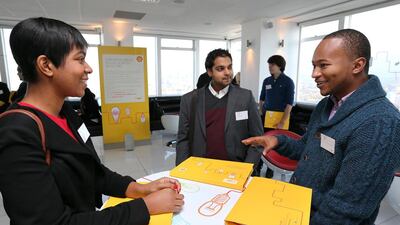LONDON // Global Entrepreneurship Week (GEW) 2013, which ends today in London, has offered European countries an opportunity to try and catch up with regions such as the United States and the Middle East in producing self-motivated entrepreneurs.
"Small business is the backbone of the economy … Over half the private sector workforce and over half of all revenues come from small businesses," Vince Cable, the UK secretary of state for business, innovation and skills, said while launching GEW.
Mr Cable said the newly formed British Business Bank, designed to help small businesses and armed with £1 billion (Dh5.91bn) of new capital, had already embarked on allocating its first £300 million tranche of funding.
Although about £50m has already been earmarked, Mr Cable is now actively trying to allocate the remaining £25m. The British Business Bank (BBB) also intends to bring under its control a further £2.9bn of existing business finance schemes.
Britain, in common with its European neighbours such as France and Germany, is anxious to foster an entrepreneurial atmosphere, which has until recently been found to be lacking in its business culture.
The Spark global entrepreneurship snapshot 2013 reports 29 per cent of the world’s entrepreneurs are from the US, 22 per cent from India, 19 per cent from the Middle East, 18 per cent from Africa and only 12 per cent from Europe.
Spark is an independent international development organisation with offices in south-east Europe, the Middle East and Africa. It focuses on people between 18 and 35 years old, to help lead their societies into prosperity.
The reasons for Europe lagging behind other regions in entrepreneurship are part cultural and part political.
European professionals have generally looked down on small traders and those involved in commerce on their own behalf. At the same time, a truly pan-European spirit of entrepreneurship has yet to emerge from the European Union.
“The process is incomplete,” says Mr Cable.
“There is, for example, still no single market in digital [products and services] across the European Union’s 28 member states.”
Even the BBB is still awaiting European state aid clearance before it can start handing over hard cash.
Nevertheless, the UK alone expects more than half a million new enterprises to be launched this year. Research from Youth Business International and the Kauffman Foundation finds half of UK entrepreneurs expect their revenue to grow by 30 per cent or more by 2016.
This is in marked contrast to the situation last year, when more than two-thirds of small business owners polled said the situation for UK entrepreneurs had stagnated or worsened over the past two years, with 34 per cent saying they had considered giving up their businesses and returning to full-time employment as a result of the recession.
“The financial crisis has finally begun to work itself out of the system,” says Andrew Devenport, the chief executive of Youth Business International.
He adds that the internet and modern electronic communications mean entrepreneurs can now address markets anywhere in the world and this should help strengthen economies such as the UK’s that are recovering from or trying to exit recessions.
“Not all the world has been living in a recessionary time. The confidence in China or South America, for example is incredible,” says Mr Devenport.
“Youth Business International focuses on young people as they embrace new technology faster.”
It is also true western European countries, with their rapidly ageing populations, need to stimulate employment for young people if they are to have enough of the population paying the taxes and supplying the skills and services demanded by the rapidly changing demographic.
Throughout the GEW, established entrepreneurs tried to pass on some of their experiences to younger potential entrepreneurs. In particular, they wish to reassure their younger counterparts that it is better to try and fail than never try at all.
“In business, failures are rarely fatal and most of them are positive in he long run,” said the former Pizza Express entrepreneur Luke Johnson, speaking at the event’s launch.
“Most of us are more disappointed by the things we didn’t do rather than those we did.”
He pointed to an early business disaster of his own, which involved the opening of an ill-fated new restaurant in New York.
Failure to use unionised labour in refurbishing the building resulted in pickets blocking the entrance of the restaurant with a giant five-metre inflatable rat.
Celebrating GEW at the British Library last week, Lord Young, the special adviser to the British prime minister David Cameron and who started his first business more than 50 years ago, also had a message last week for younger entrepreneurs.
“Working for yourself is fundamentally different from working for somebody else. Your mistakes are your own – and they really are your own,” he said.
“But so are the opportunities you seize.”
business@thenational.ae

